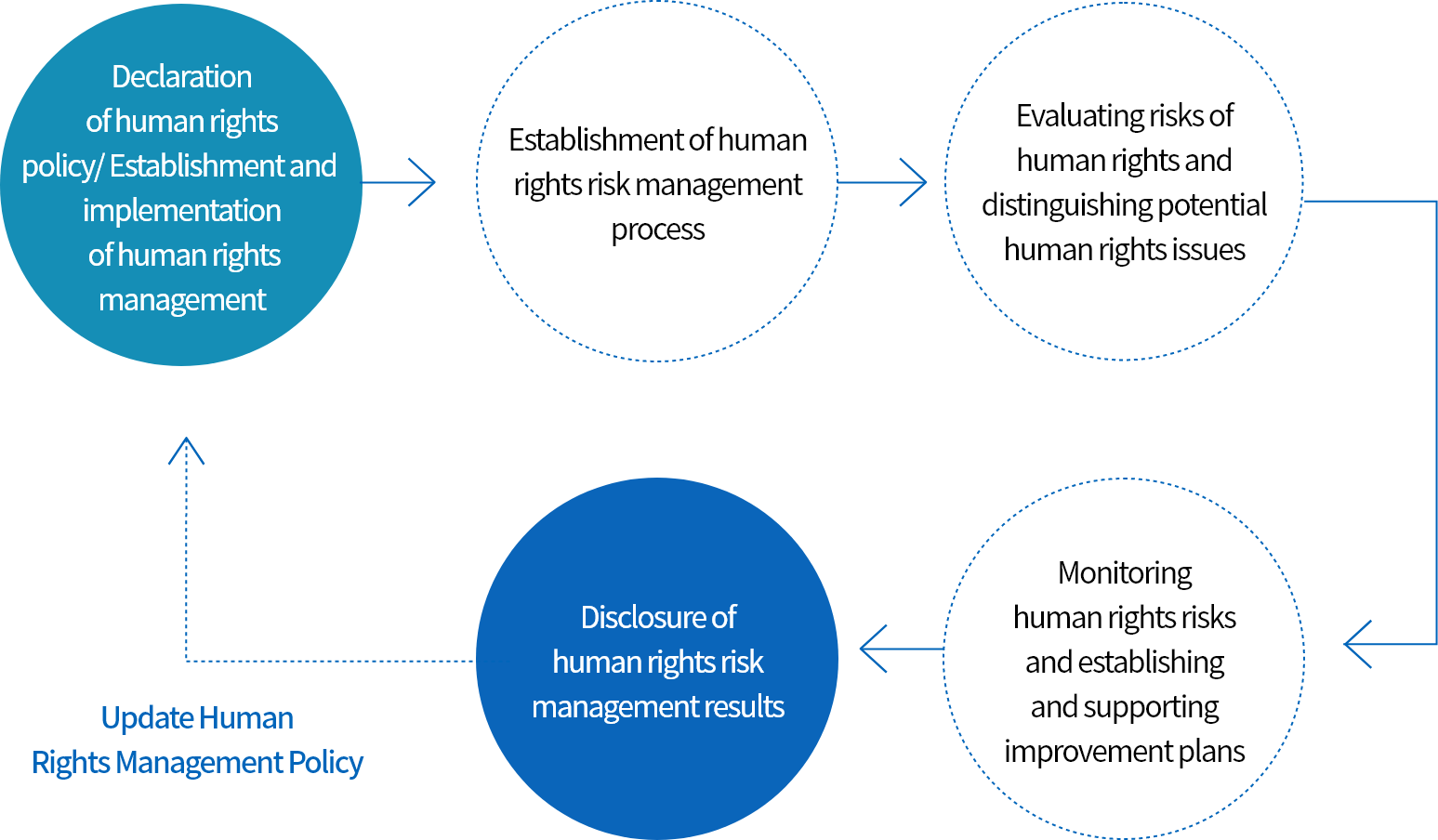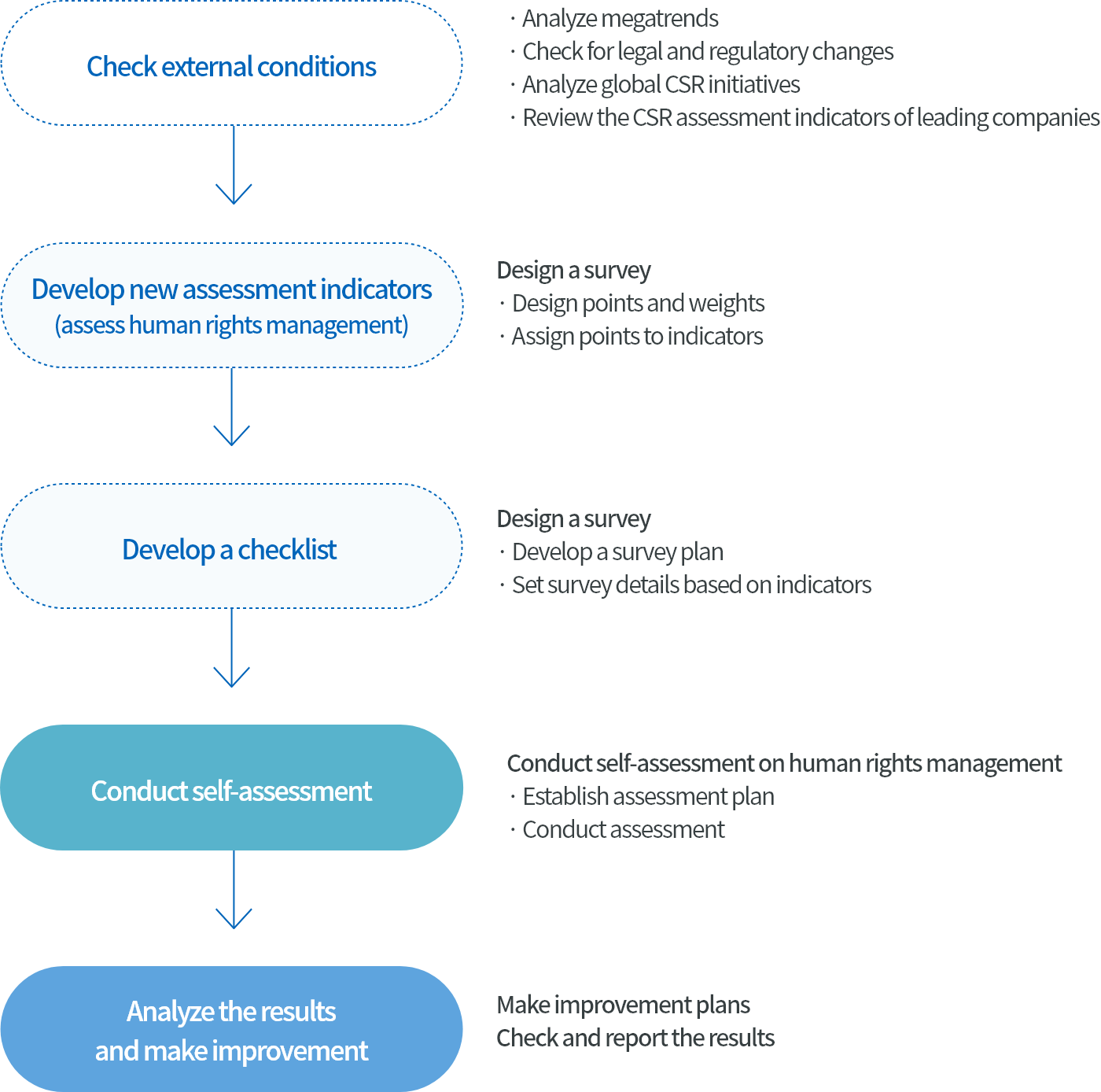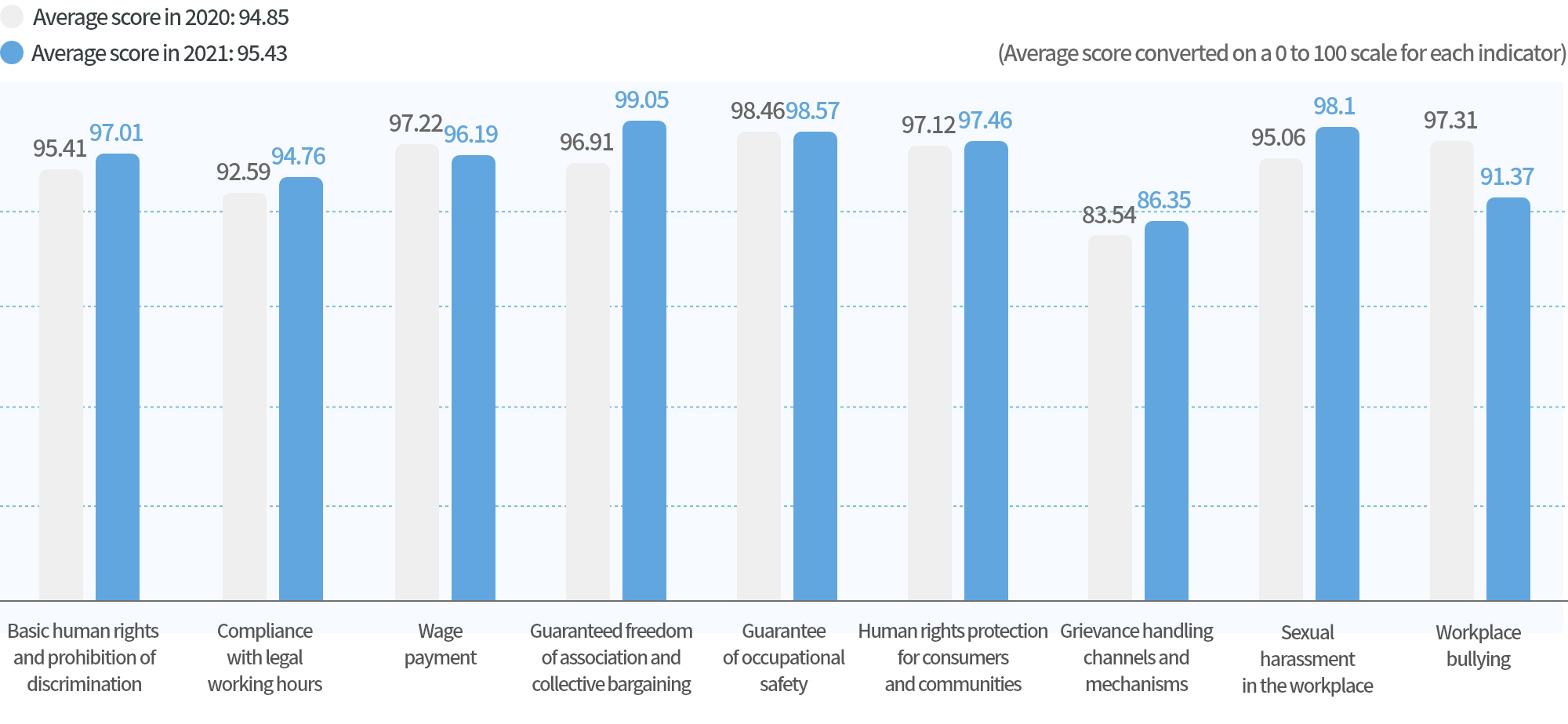Human Rights
Hyundai Steel publicly supports and ensures compliance with the standards and laws of international organizations and groups related to labor and human rights, such as the Universal Declaration of Human Rights(UDHR), the UN Principles on Business and Human Rights(UNGPs), and the International Labor Organization Convention(ILO), OECD Due Diligence Guidance for responsible Business Conduct. Through this, we realize the value of human rights, practice social responsibility in all aspects of our business, and strive to communicate with diverse stakeholders to achieve sustainable growth. The Company established the Charter of Human Rights to protect the human rights of employees and stakeholders, identify human rights issues, evaluate risks and disclose progress on human rights management. As such, our human rights management is aimed at promoting the human rights of all workers and reinforcing protection systems for stakeholders. In addition, we ensure the international human rights and labor regulations mentioned above are observed by all stakeholders, and put in place a human rights evaluation process(monitoring organizational operation and structure, follow-up measures, and internal/external reporting) for compliance check.
Human Rights Management Policies
-
01
Respect the human rights of employees, and uphold their dignity as human beings.
-
02
Take safety precaution activities approach to preventing human rights violations of stakeholders.
-
03
Consider human rights factors in all stages of business, including product development, production, sales and services.
-
04
Identify human rights risks in all the communities in which we conduct business and take the lead in realizing the value of respecting human rights.
-
Humanitarian
treatmentStrive to prevent mentally or physically inhumane treatment as part of realizing the dignity and value of humanity. Take strict measures in accordance with the relevant regulations in case inhumane treatment occurs.
-
Prohibition of
forced laborRespect the worker's freedom to choose in matters of labor. Prohibit all forms of unfair labor such as assault, intimidation, confinement, tracking, and slave labor. Comply with the Labor Standards Act in relation to labor contracts.
-
Prohibition of
child laborComply with regulations on child labor, follow appropriate procedures and provide sufficient support for workers who are minors, in accordance with laws and regulations, and continuously confirm legal compliance.
-
Prohibition of
discriminationRespect the diversity of all employees, and prevent all types of discrimination on the basis of gender, race, age, gender identity, educational background, disability, religion, political orientation and social status in employment processes such as hiring, wages, promotions, etc.
-
Compliance with
legal working hoursComply with local regulations on working hours, including regular, overtime and holiday work. Continuously monitor regulatory changes to prevent violations.
-
Guarantee of freedom
of associationPromote sound organizational development through effective and constant communication between labor-management relations. Ensure freedom of association in accordance with the relevant local laws, and prevent unfair treatment by reason of labor union membership and activities.
-
Protection of
personal informationProtect personal information of stakeholders, including customers, in accordance with local laws and regulations as part of protecting stakeholder human rights. Prohibit using personal information without the consent of the parties or for purposes other than those agreed upon.
-
Engagement with
local communitiesIdentify potential impacts on communities near business sites, listen to community feedback to prevent problems, and strive for continuous communication.
Human Rights Risk Management Process

Human Rights Assessment
Every year, we conduct human rights assessment on our business sites and suppliers in order to prevent and reduce human rights risks, as defined in our Human Rights Management Policy and Detailed Operational Guidelines. At our business sites, we conduct employee surveys that include items relating to human rights in order to assess compliance with the aforementioned policy and guidelines. We also conduct ESG surveys, that include human rights items, on our suppliers as well as on-site due diligence at business sites where key risks were found. If human rights risks are discovered during these processes, we take action to confirm and address issues as part of our efforts to protect human rights company-wide.
Human Rights Risk Management Process

Diagnosis of Human Rights Risks and On-site Due Diligence
Hyundai Steel has designated a department dedicated to human rights risk assessment to prevent negative impacts on human rights and operates a process to identify human rights risks in advance. Human rights assessment targets employees and suppliers through written evaluation and on-site due diligence for the purpose of finding human rights risks that may arise at business sites, and the dedicated department addresses human rights risks identified through the process.
Accordingly, Hyundai Steel conducted human rights assessment on employees, women, children, migrants, contract workers, suppliers, and local communities based on diagnostic items developed with external institutions. To enhance understanding of human rights management, the Company provided ESG mindset training, including human rights management, for all employees, 99.9% of whom completed the training.
As part of supply chain ESG management, the Company expanded human rights assessment to 351 suppliers in 2021. Among them, human rights risks were found in 26 suppliers, such as inadequate employment rules and the absence of a grievance handling system. 23 out of the 26 suppliers addressed the risks by improving their internal regulations, which was confirmed by the Company.
Result of the Human Rights Assessment
Human Rights Risk by Target 1), 2)
| Human Rights
Issues |
Target | |||||
|---|---|---|---|---|---|---|
| Employees | Women | Children | Migrant/contract
workers |
Suppliers | Local
communities |
|
| Working environment (emotional labor, freedom of association, harassment, discrimination) | Low risk | Low risk | Low risk | Low risk | Low risk | Potential risk |
| Working condition(forced labor, working hour, salary) | Low risk | Low risk | Low risk | Low risk | Low risk | Potential risk |
| Safety and health(protection gear, safety facilities) | Low risk | Low risk | Low risk | Low risk | Low risk | Low risk |
| Impact of business(social, environmental impact on local community, grievance resolution mechanism) | Low risk | Low risk | Low risk | Low risk | Low risk | Low risk |
| Conflict minerals (human rights violation associated with raw materials sourcing) | Potential risk | Low risk | Low risk | Low risk | Low risk | Potential risk |
- 1) Human rights risk assessment was conducted on a scale of 0 to 60 points. Potential risk: less than 30 points, Low risk: more than 30 points
- 2) The impact of human rights issues relating to children is determined based on a human rights risk survey on 'employees, women, migrant/contract workers, suppliers and local communities'.
Improvement Measures by Suppliers and Progress on On-site Due Diligence
Hyundai Steel required 26 suppliers at the bottom of the assessment result and conducted on-site due diligence.
As a result, 23 suppliers completed improvement measures addressing human rights risks and shared the result to the Company. (Over the past three years, 59 suppliers were found to have human rights risks and 47 of them completed improvement measures.)
| Classification | Target | Category | Activity |
|---|---|---|---|
| Improvement measure | Supplier's employee |
Supplier A |
|
| Supplier B |
|
||
| On-site due diligence | Supplier's employee |
Supplier |
|
Human Rights Risks, Average Score by Indicator
Hyundai Steel evaluated human rights risks on all of its six domestic business sites and 16 overseas subsidiaries manufacturing products. Human rights risks were found at two business sites, and these risks were all addressed by improvement measures. (Over the past three years, 3 of 22 domestic and overseas business sites have completed improvement measures.)

Improvement Measures and Progress on On-site Due Diligence of Business site
| Classification | Target | Supplier | Activity |
|---|---|---|---|
| Improvement measure | Employee | Business site A |
|
| Business site B |
|
||
| On-site due diligence | Employee | Business site |
|